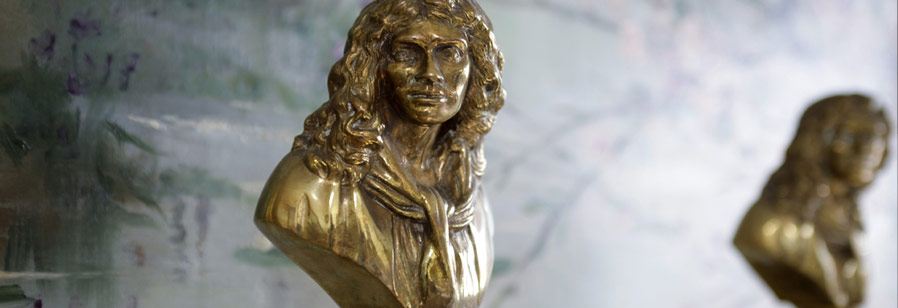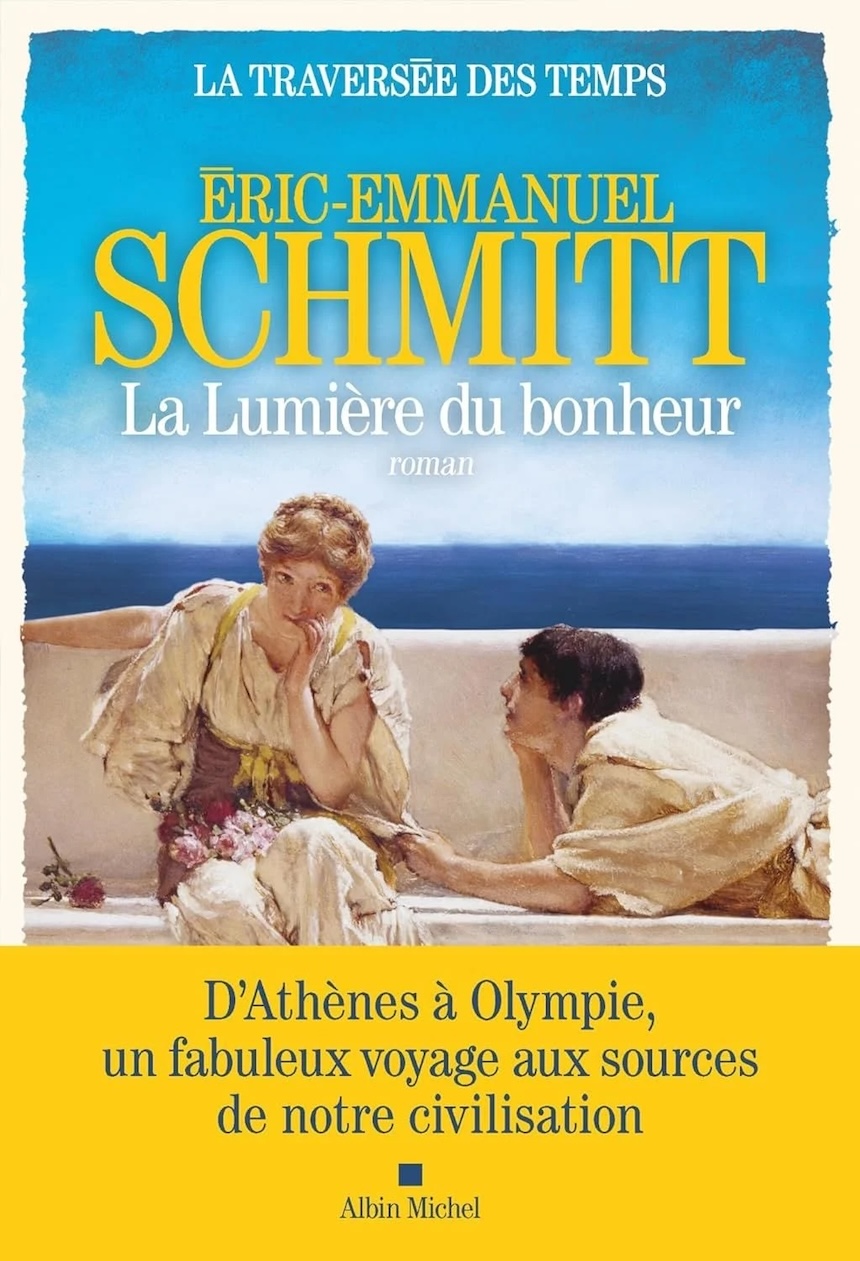Résumé
Avec Milady, Éric-Emmanuel Schmitt a conçu une nouvelle adaptation nerveuse, riche en rebondissements, pleine d'esprit, d'humour et d'émotion inspirée par le roman populaire d'Alexandre Dumas, Les Trois Mousquetaires. Milady entraînera les spectateurs dans un tourbillon d'actions, de sentiments rocambolesques, de duels sensationnels et d'imagerie épique.
Commentaires
« Si Les Trois mousquetaires est... »
Si Les Trois mousquetaires est une histoire de garçons qui plait tant aux garçons, c'est parce qu'il y a, en son centre secret, une femme incroyablement belle, intelligente et sensuelle, imprévisible, dont l'étreinte peut-être délicieuse ou mortelle, parfois les deux ensemble : Milady de Winter.
Elle est la première « femme fatale » de ma vie... Celle qui attire au-delà du raisonnable, créant l'extase, le plaisir, le romanesque, l'intense jusqu'à la perte... Pour elle, à l'âge de huit ans, j'ai eu d'emblée les yeux de d'Artagnan.
Soyons francs : avec Constance Bonacieux, d'Artagnan vit des amours pépères, confiantes, calmes, qui sentent le pot-au-feu ; oui, Constance - comme son nom l'indique -, c'est le genre de femme qui vous transforme en époux, en Monsieur Bonacieux, même si vous êtes son amant ; avec elle, vous vieillirez et vous prendrez du ventre. Milady, au contraire, c'est l'aventure, la course, le manque de sommeil, les surprises, les trahisons, l'incertitude, le sexe forcené, les remords, les espoirs, les promesses démenties, les petits matins fourbus. Avec elle, ce sera riche, exaltant et ça finira mal. La vie, quoi...
Lorsque j'avais huit ans, je n'éprouvais aucun intérêt envers les livres qu'on me procurait, ces romans de la bibliothèque rose ou verte écrits pour la jeunesse, ragoûts fades qui ne me laissaient aucun souvenir ; j'ai même cru, avec un soupçon de honte, que, contrairement à mes proches, je n'aimerai pas lire.
Les Trois Mousquetaires ont changé mon destin. Ces cinq cents pages m'ont passionné. Alexandre Dumas me donnait le goût de la lecture - et de l'existence adulte. Soudain, mon coeur battit à l'unisson des personnages, tantôt d'Artagnan, tantôt Athos, tantôt Aramis, soudain proche de Richelieu, devenant Buckingham, explorant pour la première fois la complexité de l'âme humaine.
Il n'y avait qu'un seul personnage auquel je ne m'identifiais pas, c'était Milady de Winter. Et pour cause : je subissais sa séduction.Je découvrais alors un de mes points faibles, qui serait une constante des années à venir : j'adore les garces qui ont de l'allure.
Avec le temps, j'ai approfondi - j'espère - ma relation avec ce genre de sublimes scélérates et j'ai tenté d'approcher leur mystère.
Ainsi, en voyant Milady, cette version des Trois Mousquetaires qui prend l'aventurière comme personnage principal, vous aurez sans doute la surprise de comprendre ce monstre sans la juger. Car, si elle est souvent bourreau, elle est autant victime. Quoiqu'elle attaque, elle se défend aussi, et avec les armes que lui laisse une société dure, intolérante, qui ne veut pas d'elle.
Même si le spectacle aura l'apparence d'une comédie d'aventure, c'est une tragédie qui se joue en dessous, une tragédie complexe, car Dumas, grand auteur malgré ses nègres ou ses négligences, a créé un univers complexe, ambigu où aucun de ses personnages, ni d'Artagnan, ni Richelieu, ni Milady, n'a un comportement clair, parfait, moralement droit ou acceptable. Ils vont au bien ou au mal en fonction de leurs désirs ou de leurs intérêts. Impurs, tous.
En écrivant cette Milady, j'ai éprouvé à la fois un plaisir d'enfant et un plaisir d'adulte : retrouver la palpitation de cette histoire qui m'a tant fait vibrer autrefois et ajouter la maturité de mon regard.
Je vous propose donc, avec cette Milady de soie, de dentelles et de poignards, la version féminine des Trois mousquetaires.
Voire la version féministe ?
Eric-Emmanuel Schmitt
Critiques
La Libre Belgique - « “Milady”, seule contre tous »
Le spectacle “Milady”, présenté en première vendredi soir dans les ruines de l’abbaye de Villers-la-Ville, répond en tous points aux déclaration d’intention de ses organisateurs. Prenez un chef d’œuvre romanesque (“Les Trois Mousquetaires” d’Alexandre Dumas), compilez toute l’information disponible sur un personnage secondaire capital (Milady) et réécrivez l’histoire en dialogues théâtraux autour d’elle. Pari tenu et gagné pour Eric-Emmanuel Schmitt -auteur dont le succès populaire lui vaut, comme à Dumas, la méfiance des lettrés- qui signe une partition originale en restituant les principaux épisodes de l’action (...) Ses dialogues sont vifs et bien menés et, surtout, il va droit aux émotions fortes.?Et celles-ci ne manquent pas dans le terrible destin de Milady! A telle enseigne qu’on a senti Natacha Amal, flamboyante et vibrante à travers toute la représentation, flancher au moment des saluts, comme submergée par la puissance des sentiments.?C’est qu’elle incarne la figure du mal, immolée au final par les adversaires qu’elle a levés contre sa personne dans sa quête folle d’une revanche sur la vie et les hommes. A la mise en scène, Pascal Racan a réglé tout cela sans chichis, soulignant fermement les moments clés dans un souci de lisibilité immédiate. (...) Somptueux et innombrables (une douzaine de robes pour la seule Milady), les costumes de Thierry Bosquet jouent même d’autodérision quand Richelieu manipule avec des airs avantageux la traîne démesurée de sa soutane fellinienne.
Philip Tirard
L'Avenir - « Les ruines de Villers à la merci de “Milady” »
“Milady”, c’est toute la magie de l’univers de Dumas revisitée par Eric-Emmanuel Schmitt dans un décor exceptionnel.?Un vrai moment de plaisir. Un spectacle mené tambour battant par le metteur en scène Pascal Racan qui a fait choix d’imprimer un rythme endiablé à l’intrigue.?Ni flottement, ni ennui dans les ruines. (...) Embellies par les savants éclairages de Christian Stenuit, les ruines de l’abbaye de Villers-la-Ville se présentent sous leur meilleur jour.?Un cadre enchanteur, mystérieux et envoûtant qui suffirait à lui seul à ravir les spectateurs.?Mais les ambitions de la production vont bien au-delà.?Patrick de Longrée et Rinus Vanelslander (Del Diffusion) ont mis les petits plats dans les grands pour ravir leur public. Leurs efforts sont couronnés de succès: tous les ingrédients y sont, et la sauce a pris.?La qualité du texte n’y est pas pour rien.?Eric-Emmanuel Schmitt propose une adaptation très libre des “Trois Mousquetaires” d’Alexandre Dumas dont le personnage central est Milady de Winter.?A la fois vif, drôle et intelligent, le texte développe un authentique drame, celui d’une femme certes ambitieuse et vénéneuse mais non sans nuances. (...) Natacha Amal campe avec engagement ce personnage hors normes dans toute sa complexité. L’héroïne est parfaitement entourée de dix-huit comédiens de qualité. (...) Imaginés par le chorégraphe Jacques Cappelle, les combats sont un régal pour les yeux, au moins autant que les splendides costumes créés par Thierry Bosquet, de l’interminable traîne rouge sang de Richelieu à la garde-robe pléthorique de Milady.?Du grand art.
Ariane Bilteryst
Le Soir - « De cape, d’épée et de dentelles »
Dans l’abbaye cistercienne, l’adaptation d’Eric-Emmanuel Schmitt détrône les mousquetaires. Du grand spectacle populaire: combats d’épée, froufrous à gogo, décor et lumières grandioses. En renversant la perspective d’Alexandre Dumas, Eric-Emmanuel Schmitt dévoile des mousquetaires coureurs de jupons, parfois menteurs et meurtriers, bref loin de l’auréole sympathique que la tradition a laissée.?Au contraire, en s’attardant sur l’enfance de Milady, l’adaptation donne des circonstances atténuantes au comportement machiavélique de la femme (littéralement) fatale. (...) A la mise en scène, Pascal Racan rythme savamment l’intrigue, dans un mouvement perpétuel qui alterne combats à l’épée et dialogues empoisonnés.?Dynamique elle aussi, la scénographie transforme les escaliers monumentaux en alcôve, taverne ou palais.?Les costumes d’époque et les lumières hollywoodiennes complètent la panoplie de ce spectacle populaire, qui nous donne presque envie de voir la cape revenir à la mode.
Catherine Makereel
La Nouvelle Gazette - « Villers-la-Ville accueille une troublante Milady »
(...) La version villersoise de Milady est l’œuvre d’une plume reconnue dans le monde entier. Eric-Emmanuel Schmitt a choisi une vision féminine de l’œuvre “ Les trois Mousquetaires ”. La vie et les intrigues de cette ravissante blonde, perfide et enjôleuse, bousculent tous les clichés machistes et révèlent une forte personnalité torturée par la jalousie.
Campée superbement par Natacha Amal, la jeune héroïne captive et subjugue les spectateurs par sa détermination et un charisme extraordinaire. De son côté, Pascal Racan, indéfectible défenseur du théâtre à Villers, signe ici une merceilleuse et captivante mise en scène. Les actions se succèdent et les spectateurs sont transportés avec un rare talent au cour même du célèbre roman d’Alexandre Dumas. (...) Lors de la première, l’accueil du public fut particulièrement chaleureux. Plusieurs rappels ont été nécessaires pour étancher sa stisfaction et son bonheur.
Marcel Van Caster

